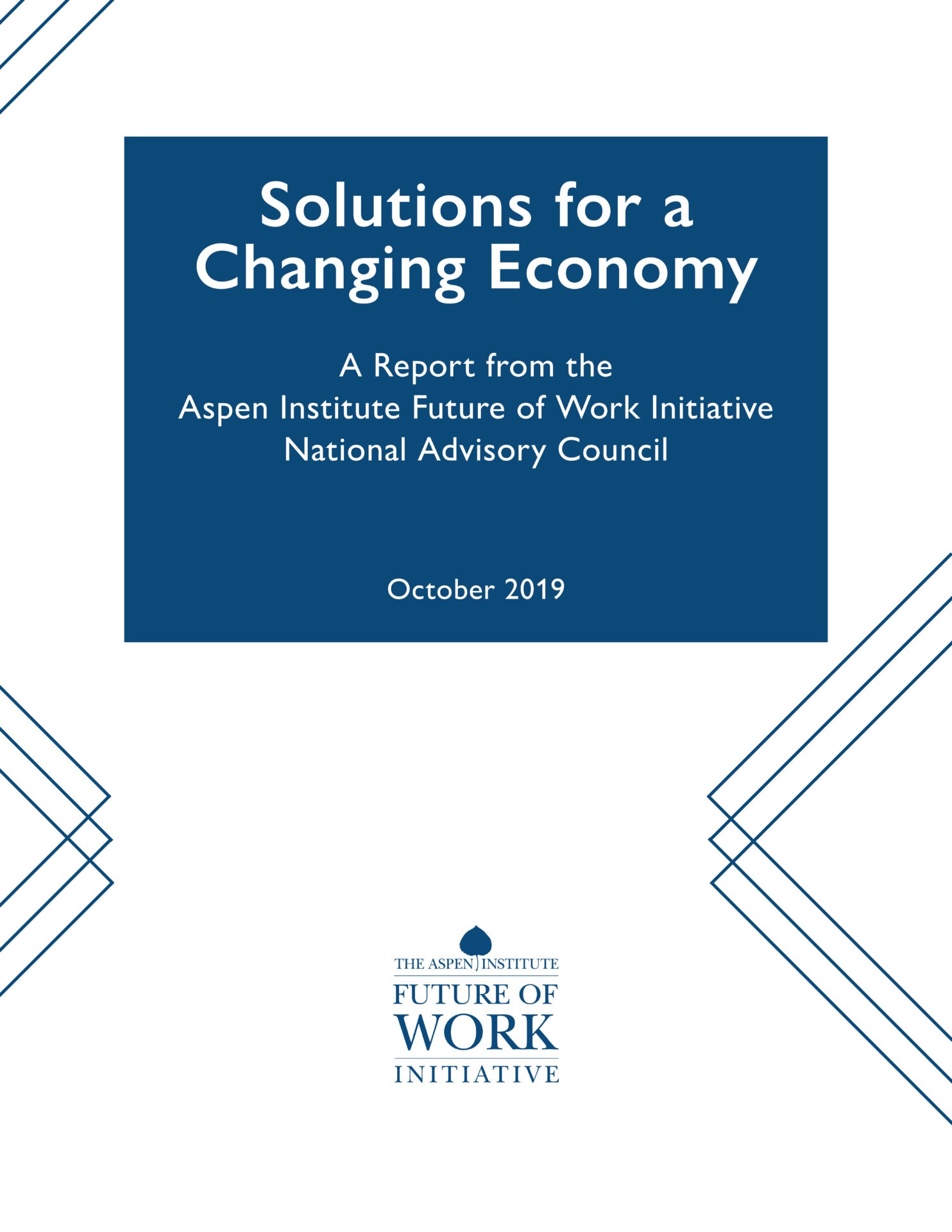The Aspen Institute Future of Work Initiative National Advisory Council was formed with the belief that the changing economy and the impact it has on work requires new ideas and strategies to best help workers and businesses adjust and thrive. The Advisory Council puts forward the ideas and recommendations in this publication in the spirit of inviting more analysis and discussion around how best to respond to and prepare for the future of work.
Introduction
Automation, artificial intelligence, shifting work arrangements, and shareholder pressure to focus on short-term profits over long-term value creation are challenging companies and workers in today’s economy. Whether through national headlines or prominent reports, like the Council on Foreign Relations’ 2018 report, The Work Ahead: Machines, Skills, and U.S. Leadership in the Twenty-First Century, or the International Labour Organisation Global Commission on the Future of Work’s 2019 report, Work for a Brighter Future, the changing nature of work has drawn the attention of those working to build a more inclusive and competitive American economy. This requires policymakers and private sector leaders alike to develop a new social contract that responds to the challenges of the 21st century while rewarding work, creating opportunity, and reversing the concerning trend of increased economic insecurity.
We have seen transformational breakthroughs in technology’s ability to perform functions that were once considered unique to humans. Varying estimates suggest the impact on employment could be dramatic, especially for workers who perform routine and predictable tasks. McKinsey Global Institute estimates that half of today’s work activities have the potential to be automated with existing technologies, and a recent Brookings Institution report found that roughly 25 percent of jobs in the U.S. will face high exposure to automation in the coming decades.
The experience of the manufacturing sector over the past forty years highlights the lost opportunity to develop comprehensive strategies to help workers displaced by the same forces shaping the economy today—technology, globalization, and outsourcing—and the fierce urgency of doing so now. Those who lost jobs often ended up either finding new jobs that paid less or not finding work at all. Yet the scope of the change that automation could bring in the years ahead holds the potential to impact workers across all industries. While various public and private sector approaches are underway to help more people from losing more ground, significant work remains to keep the workers and communities impacted from falling behind. And if done right, these new approaches will give more people an opportunity to earn a better future.
The reality is that the ways in which people work are evolving. Today, it is increasingly common for companies to hire independent contractors and temporary workers for short-term and project-based work instead of hiring full-time employees. According to a recent government survey, roughly one in ten workers participate in “alternative work arrangements”—independent contracting, on-call, temporary help agency, and subcontracted work—for their main job. Millions more engage in this type of work to supplement their income. Whether motivated by choice or necessity, people are piecing together work in order to make a living. This type of work can provide additional flexibility and earning opportunities, but also brings unique challenges and raises questions about access to secure and stable work, and the set of programs that has been established to provide a safety net to workers.
Many workers can no longer expect a career-long employer and instead they should expect to hold many different jobs that require different skills throughout their careers. Employers, education and training providers, and policymakers are creating new systems to help workers adapt to ever-changing requirements to enhance hard and soft skills. At the same time that businesses should be investing more in their workforce, they face shareholder pressure to produce short-term profits, even if that means they must forego investments that would create value in the long term.
To meet both the opportunities and challenges of an evolving 21st century economy, private and public sector leaders must develop new approaches. The Future of Work Initiative National Advisory Council was established in December 2017 to help understand the challenges, as well as the opportunities, presented by the changing nature of the economy and its impact on work. Over the course of 2018, the Advisory Council assessed how the economy is changing, and explored proposals designed to help respond to the challenges around the future of work. By sharing this set of ideas, the Advisory Council seeks to encourage continued dialogue and action on these issues, especially among policymakers, to support an economy that works better for all Americans.
This report provides specific policy recommendations in three key areas:
- Independent Work;
- Automation, Artificial Intelligence, & Lifelong Learning; and
- Inclusive Capitalism & Human Capital.
The institutions of our modern economy are not keeping pace with the changes resulting from advances in technology and globalization. For all Americans to have an opportunity to succeed, new approaches are needed. The Aspen Institute Future of Work Advisory Council puts forth these proposals to contribute to and encourage progress towards responding to and preparing for the future of work.


